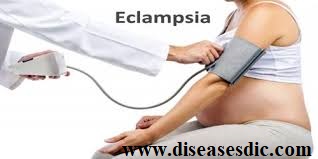Description
Eclampsia is defined as the occurrence of seizures in pregnancy or within 10 days of delivery, accompanied by at least two of the following features documented within 24 hours of the seizure: hypertension, proteinuria, thrombocytopenia or raised aspartate aminotransferase. Seizures are periods of disturbed brain activity that can cause episodes of staring, decreased alertness, and convulsions (violent shaking).
Eclampsia is the final stage of preeclampsia and requires immediate medical attention. Most cases are detected early in the pregnancy before they can progress to it.
Pathophysiology of Eclampsia
Inhibition of uterovascular development
Many uterovascular changes occur when a woman is pregnant. It is believed that these changes are due to the interaction between fetal and maternal allografts and result in systemic and local vascular changes.
Hindrance of cerebral blood flow regulation
It is believed that in eclampsia there is abnormal cerebral blood flow in the setting of extreme hypertension. The regulation of cerebral perfusion is inhibited, vessels become dilated with increased permeability, and cerebral edema occurs, resulting in ischemia and encephalopathy.
Endothelial dysfunction
Factors associated with endothelial dysfunction have been shown to be increased in the systemic circulation of women suffering from eclampsia.
Oxidative stress
Evidence indicates that leptin molecules increase in the circulation of women with eclampsia, inducing oxidative stress, another factor in eclampsia, on cells. (The leptin increase also results in platelet aggregation, most likely contributing to the coagulopathy associated with it.)
Causes of Eclampsia
- No one knows what exactly causes preeclampsia or eclampsia, although abnormalities in the endothelium (the inner layer of blood vessel walls) have been considered as a potential cause.
- Since the exact cause of preeclampsia or eclampsia is poorly understood, it is not possible to effectively predict when preeclampsia or eclampsia will occur or to enact any preventative measures that might prevent these problems from developing.
- Preeclampsia usually occurs during an initial (first) pregnancy.
Risk factors pertaining to Eclampsia
Risk factors for preeclampsia and eclampsia will vary from patient to patient. Factors that should be taken into consideration are:
- Pregnancy history: Most cases of preeclampsia happen in first pregnancies. Previous pregnancies with poor outcomes could also increase the risk of developing eclampsia.
- Patient age: Teen pregnancies and pregnancies in women over 35 have an increased risk of developing it.
- Family history: Cases of preeclampsia or eclampsia in family members could signal a genetic predisposition to the condition.
- Obesity: Women who are obese are at a higher risk of developing eclampsia than others.
- High blood pressure: Patients with long-term high blood pressure are at a higher risk of developing eclampsia than others.
- Other medical conditions, including lupus, gestational diabetes, and renal disease, also increase the chances of developing it.
Symptoms
Because preeclampsia can lead to eclampsia, you may have symptoms of both conditions. However, some of your symptoms may be due to other conditions, such as kidney disease or diabetes.
The following are common symptoms of preeclampsia:
- Swelling in your face or hands
- Headaches
- Excessive weight gain
- Nausea and vomiting
- Vision problems
- Difficulty urinating
The following are common symptoms of eclampsia:
- Seizures
- Loss of consciousness
- Agitation
- Headaches or muscle pain
- Upper right abdominal pain
Complications of Eclampsia
Eclampsia does have some associated conditions that can either present as symptoms or stand-alone conditions. These conditions include:
- Edema: Tissue swelling caused by the buildup of fluid in the tissues. This usually presents as swelling in the extremities.
- Pulmonary edema: Causes the same fluid buildup in the lungs, which can lead to difficulty breathing.
- A headache: Possibly caused by the high blood pressure caused by eclampsia.
- Gestational diabetes: Diabetes symptoms caused by pregnancy, which can cause the baby to gain excessive weight during gestation.
Diagnosis and Test
If you already have a preeclampsia diagnosis or have a history of it, your doctor will order tests to determine if your preeclampsia has happened again or gotten worse. If you don’t have preeclampsia, your doctor will order tests for preeclampsia as well as others to determine why you’re having seizures.
The health care provider will do a physical exam to look for causes of seizures. Blood pressure and breathing rate will be checked regularly.
- Blood and urine tests may be done to check:
- Blood clotting factors
- Creatinine
- Hematocrit
- Uric acid
- Liver function
- Platelet count
- Protein in the urine
Treatment and Medications
If you do develop eclampsia, your doctor may deliver your baby early, depending on how far along you are in your pregnancy. Early delivery may occur between 32 and 36 weeks of pregnancy if you have life-threatening symptoms or if medication doesn’t work. You may need to be hospitalized until you can deliver your baby.
Medications
Medications to prevent seizures, called anticonvulsants drugs, may be necessary. You may need medication to lower blood pressure if you have high blood pressure. You may also be placed on a low-dose aspirin.
Home care
Pay attention to your diet. Ensure you get enough calcium. You may have to go in for fetal monitoring and checkups more often. This monitoring may be done from your own home if those services are offered in your area.
Taking all prescribed medications, getting rest, and monitoring any changes in your condition are critical for managing preeclampsia and eclampsia. With proper care and careful monitoring, you can deliver without complications.
Preventions of Eclampsia
There is no way known to prevent preeclampsia and eclampsia. However, the outcome can be improved with prompt recognition and management, so it is important for pregnant women to have routine health screenings.

